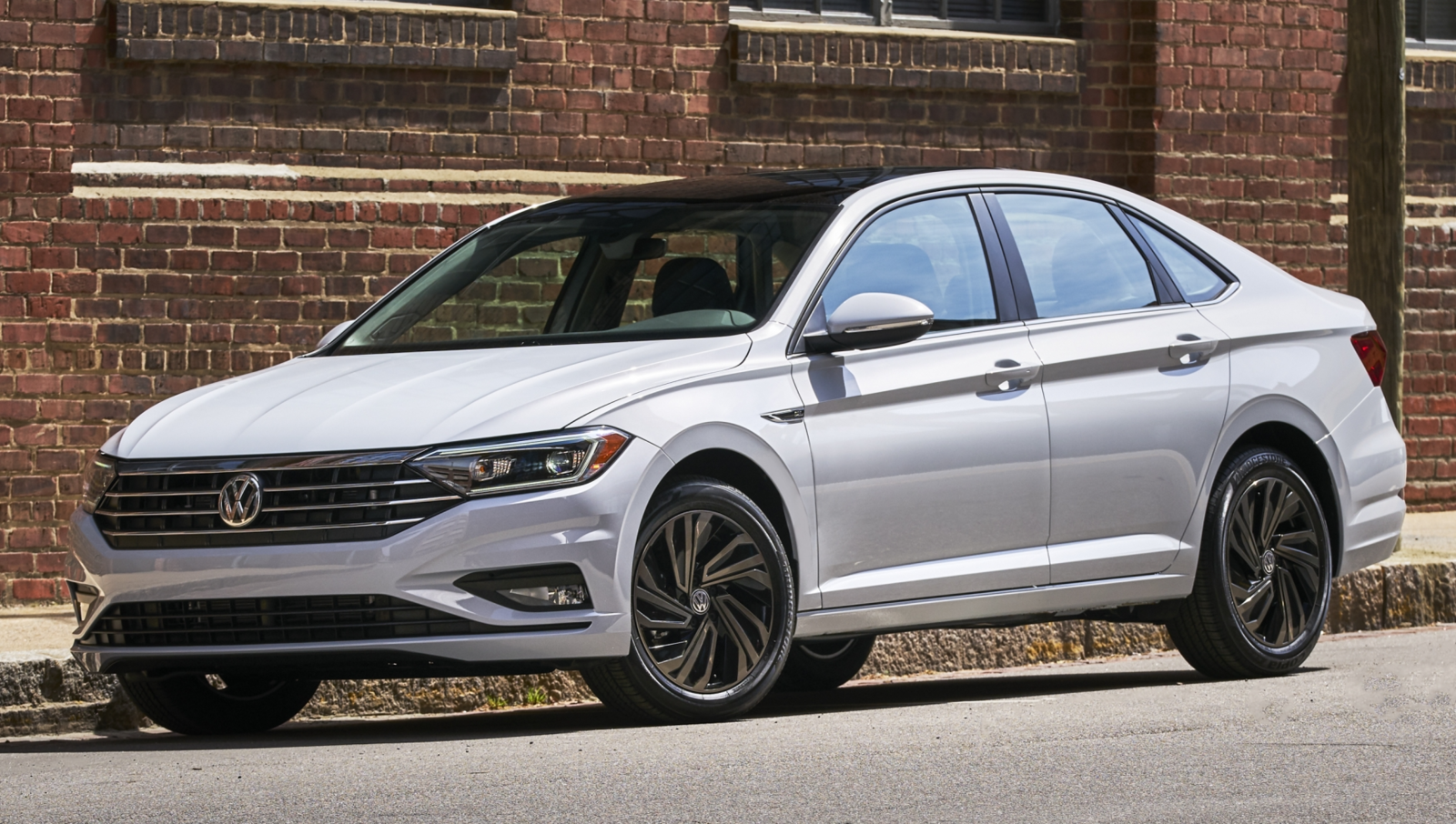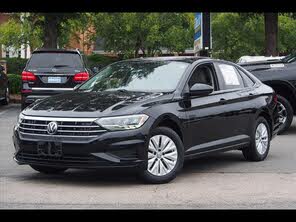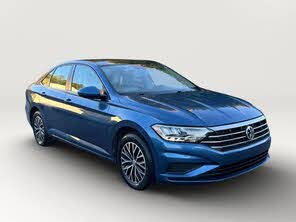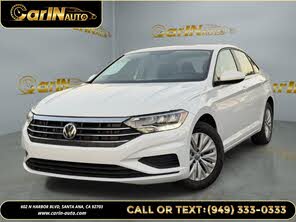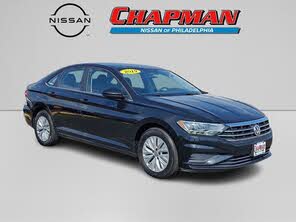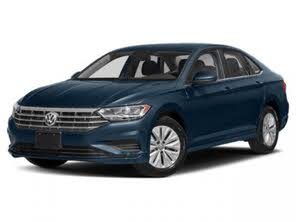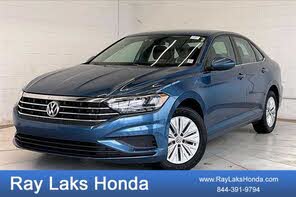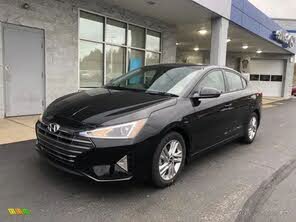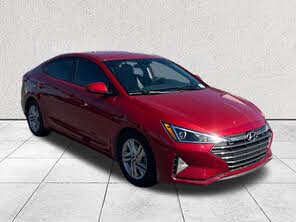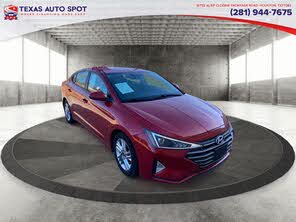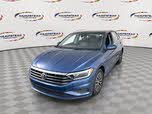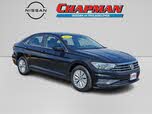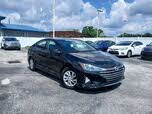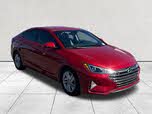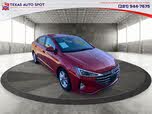2019 Volkswagen Jetta vs 2020 Hyundai Elantra
Overview | |
MSRP$18,745 | MSRP$19,300 |
Listings1090 | Listings1052 |
Ratings & Reviews | |
User Reviews | User Reviews |
Expert reviews8.2 out of 10 | Expert reviews8.3 out of 10 |
Pros
Cons
| Pros
Cons
|
2019 Volkswagen Jetta Reviews SummarySmall cars aren't asked to do much beyond the basics: provide efficient, reliable transportation at a manageable price. Plenty of models fit this form, and in some rare cases, they manage to do it while also being fun to drive, like the Mazda3. In other cases, the vehicle manages to feel more upscale than the competition, like the Honda Civic. But the Volkswagen Jetta's legacy has historically been defined by its ability to offer both an upscale interior and a rewarding driving experience. But then something happened with the Jetta. Starting with the 2011 model year, Volkswagen attempted to broaden the Jetta's appeal, and until 2018 we were left with a drab interior, an underpowered engine, and an uninspiring driving experience. VW’s hallmark was always that its cars felt a little special, so by adopting a homogenous look and feel, VW removed what made the Jetta unique and desirable to its fans. So Volkswagen had some work to do with the new seventh-generation 2019 Jetta. Will this new car move the Jetta name back toward driving refinement and upscale feel? Or will it continue to disappoint as just another bland entrant among small cars? | |
2020 Hyundai Elantra Reviews SummaryHyundai isn’t pulling any punches when it comes to the compact car segment, where value is of utmost importance. And though a completely redesigned 2021 Elantra is coming soon, the automaker bestows several value-enhancing improvements upon the outgoing 2020 Hyundai Elantra compact sedan. They include free scheduled maintenance, improved fuel economy ratings, and new standard safety features. | |
No video found | |
Popular Features & Specs | |
Engine1.4L 147 hp I4 | Engine2.0L 147 hp I4 |
Drive TrainFWD | Drive TrainFWD |
Seating Capacity5 | Seating Capacity5 |
Horsepower147 hp @ 5000 rpm | Horsepower147 hp @ 6200 rpm |
MPG City30 | MPG City31 |
MPG Highway40 | MPG Highway41 |
Engine | |
Engine Name1.4L 147 hp I4 | Engine Name2.0L 147 hp I4 |
Torque184 lb-ft @ 1400 rpm | Torque132 lb-ft @ 4500 rpm |
Horsepower147 hp @ 5000 rpm | Horsepower147 hp @ 6200 rpm |
DrivetrainFWD | DrivetrainFWD |
Fuel Economy | |
MPG City30 | MPG City31 |
MPG Highway40 | MPG Highway41 |
Interior | |
Seating Capacity5 | Seating Capacity5 |
Safety | |
Front Crash Overall4 | Front Crash Overall4 |
Side Crash Overall5 | Side Crash Overall4 |
Dimensions & Capacity | |
Cargo Space14.1 cu ft | Cargo Space14.4 cu ft |
Curb Weight2959 lbs | Curb Weight2844 lbs |
Height57.4 in | Height56.5 in |
Length185.1 in | Length181.9 in |
Width70.8 in | Width70.9 in |
Wheelbase105.7 in | Wheelbase106.3 in |
Maximum Payload970 lbs | Maximum Payload1080 lbs |
Number of doors4 | Number of doors4 |
Overview | ||
MSRP | $18,745 | $19,300 |
Listings | ||
Ratings & Reviews | ||
User reviews | ||
Expert reviews | 8.2 out of 10Read full review | 8.3 out of 10Read full review |
Pros & cons | Pros
Cons
| Pros
Cons
|
Summary | Small cars aren't asked to do much beyond the basics: provide efficient, reliable transportation at a manageable price. Plenty of models fit this form, and in some rare cases, they manage to do it while also being fun to drive, like the Mazda3. In other cases, the vehicle manages to feel more upscale than the competition, like the Honda Civic. But the Volkswagen Jetta's legacy has historically been defined by its ability to offer both an upscale interior and a rewarding driving experience. But then something happened with the Jetta. Starting with the 2011 model year, Volkswagen attempted to broaden the Jetta's appeal, and until 2018 we were left with a drab interior, an underpowered engine, and an uninspiring driving experience. VW’s hallmark was always that its cars felt a little special, so by adopting a homogenous look and feel, VW removed what made the Jetta unique and desirable to its fans. So Volkswagen had some work to do with the new seventh-generation 2019 Jetta. Will this new car move the Jetta name back toward driving refinement and upscale feel? Or will it continue to disappoint as just another bland entrant among small cars? | Hyundai isn’t pulling any punches when it comes to the compact car segment, where value is of utmost importance. And though a completely redesigned 2021 Elantra is coming soon, the automaker bestows several value-enhancing improvements upon the outgoing 2020 Hyundai Elantra compact sedan. They include free scheduled maintenance, improved fuel economy ratings, and new standard safety features. |
Video | No video found | |
Popular Features & Specs | ||
Engine | 1.4L 147 hp I4 | 2.0L 147 hp I4 |
Drive Train | FWD | FWD |
Seating Capacity | 5 | 5 |
Horsepower | 147 hp @ 5000 rpm | 147 hp @ 6200 rpm |
MPG City | 30 | 31 |
MPG Highway | 40 | 41 |
Engine | ||
Engine Name | 1.4L 147 hp I4 | 2.0L 147 hp I4 |
Torque | 184 lb-ft @ 1400 rpm | 132 lb-ft @ 4500 rpm |
Horsepower | 147 hp @ 5000 rpm | 147 hp @ 6200 rpm |
Drivetrain | FWD | FWD |
Fuel Economy | ||
MPG City | 30 | 31 |
MPG Highway | 40 | 41 |
Interior | ||
Seating Capacity | 5 | 5 |
Safety | ||
Front Crash Overall | 4 | 4 |
Side Crash Overall | 5 | 4 |
Dimensions & Capacity | ||
Cargo Space | 14.1 cu ft | 14.4 cu ft |
Curb Weight | 2959 lbs | 2844 lbs |
Height | 57.4 in | 56.5 in |
Length | 185.1 in | 181.9 in |
Width | 70.8 in | 70.9 in |
Wheelbase | 105.7 in | 106.3 in |
Maximum Payload | 970 lbs | 1080 lbs |
Number of doors | 4 | 4 |
The 2019 Volkswagen Jetta showcased a refined, modern look compared to its earlier iterations. Slightly longer and wider by about an inch, it maintained the same height, creating a robust, upscale presence. The front fascia was dominated by a wide, angular grille, inspired by the new VW Arteon, bringing a touch of sport sedan elegance to the compact segment. This transformation was much more dramatic compared to the previous generation's typical and somewhat dull appearance.
VW's new design philosophy showed a clear intent to move the Jetta upmarket, sprucing up not just the exterior but also the interior. The cabin complemented the exterior's angular design, offering a harmonious visual flow. Those who stepped inside found a blend of space, comfort, and functionality. While not all surfaces were soft-touch, they were thoughtfully placed to enhance the overall premium feel.
Various trims were available: S, SE, R-Line, SEL, and SEL Premium. Interestingly, Volkswagen confidently sent the base S trim for reviews, which came generously equipped. It boasted 16-inch alloy wheels, LED lights, and a 6.5-inch touchscreen with Volkswagen’s Car-Net App-Connect along with Apple CarPlay and Android Auto.
The SE trim added V-Tex leatherette seating, a panoramic moonroof, more intricately designed alloy wheels, and numerous comforts like heated front seats and dual-zone climate control. The R-Line introduced sportier elements with exclusive bumpers, side skirts, and a blacked-out grille, all riding on 17-inch alloy wheels. Moving up to the SEL brought about technologically advanced features like upgraded LED projector headlights, rain-sensing wipers, and a more extensive 8-inch infotainment system.
Finally, the SEL Premium rounded out the lineup with exclusive features such as a heated steering wheel, an 8-way power-adjustable driver's seat with memory settings, heated rear seats, leather upholstery, and a navigation system integrated into the upgraded touchscreen.
In contrast, the 2020 Hyundai Elantra came with an unchanged look from its stylish 2019 redesign. Hyundai leaned into a geometric-inspired design language, setting the stage for a more angular future model slated for 2021. The six trims were SE, SEL, Value Edition, Eco, Limited, and Sport, with prices ranging from $19,300 to $24,150.
A black exterior highlighted the Elantra’s bold headlights, fog lights, and intricate wheel designs, providing a high contrast to the chrome accents. While perhaps not universally appealing, it certainly made a visual statement.
The restyled interior introduced a more premium feel with silver trim accents around key components like the air vents, climate control panel, and steering wheel. Glossy plastics remained to remind users of the car's mainstream compact status, but the updates improved the overall perception of quality.











The 2019 Volkswagen Jetta was powered by a 1.4-liter turbocharged inline 4-cylinder engine, delivering 147 horsepower and 184 pound-feet of torque. Although it had 3 horsepower less than its predecessor, the engine felt more responsive, especially at lower speeds. This agility was partly due to its new 8-speed automatic transmission, which replaced the previous 6-speed version and allowed for efficient power distribution across a wider range of speeds.
The base manual transmission was also upgraded to a 6-speed, enhancing the driving experience for those who preferred shifting themselves. The Jetta’s powertrain excelled in both city and highway driving, managing smooth acceleration from a standstill and impressive overtaking power even at higher speeds. The car’s steering was praised for its balance, blending smoothness with sportiness, and handling corners with precision and minimal body roll.
In terms of fuel efficiency, both the automatic and manual Jetta averaged 30 miles per gallon city, 40 highway, and 34 combined, demonstrating no efficiency trade-off between transmission choices.
For the 2020 Hyundai Elantra, the base engine was a 147-horsepower, 2.0-liter four-cylinder paired with a new continuously variable transmission (CVT). This new powertrain replaced the former six-speed automatic and the previously available six-speed manual gearbox, resulting in a $1,100 price increase over the prior year’s model. The Elantra also offered specialized models like the Eco and Sport, with unique engines and performance characteristics.
The Eco model featured a 1.4-liter turbocharged four-cylinder engine producing 128 horsepower but an enhanced 156 pound-feet of torque, paired with a seven-speed dual-clutch automatic transmission (DCT). It incorporated an automatic start/stop system and achieved a combined fuel economy of 36 mpg.
The Elantra Sport provided a more spirited driving experience with a 1.6-liter turbo four-cylinder engine generating 201 horsepower and 195 pound-feet of torque. It abandoned the standard rear beam-axle suspension for an independent rear design, enhancing ride quality and handling. However, like the Eco, the Sport trim also transitioned to a DCT in place of the manual gearbox.
Despite the new CVT's advanced features and claimed efficiency, real-world testing with the Limited trim, equipped with the 2.0-liter engine, resulted in an average of just 29.3 mpg—short of the anticipated 34 mpg. Additionally, this was slightly less efficient than the previous year's Elantra with the six-speed automatic, which averaged 29.5 mpg on the same testing route.
The Elantra's ride quality suffered due to its torsion beam axle rear suspension. While this suspension design was common in compact cars, it often led to a less refined ride, as the impact on one wheel affected the entire rear axle. This design resulted in a somewhat unsettled feeling, unlike the Elantra Sport's independent suspension, which provided a smoother ride despite its firmer tuning. The standard Elantra, though adequate for daily commuting, lacked the excitement some drivers might seek.
The 2019 Volkswagen Jetta offered comfortable seating for both front and rear passengers, with a minor reduction in legroom that most users wouldn't notice. Front seats were well-praised for their comfort even on long drives, while rear-seat space was considered adequate. The trunk, though reduced from 15.7 cubic feet to 14.1 cubic feet, still provided average storage space for the class. Volkswagen's thoughtful design changes, such as relocating the touchscreen above the climate vents and adjusting the shifter position, improved usability and in-cabin storage.
Similarly, the 2020 Hyundai Elantra was roomy for a compact car, accommodating four adults comfortably, with a fifth only recommended for short trips. The Limited trim came equipped with power driver’s seat adjustment, leather upholstery, and a sliding center console armrest for added comfort. Additionally, Hyundai included a front passenger seat-height adjuster and a dual-zone automatic climate control system.
Interior storage was suitably designed for a compact car, and the Elantra's trunk offered 14.4 cubic feet of space, closely rivaling the Jetta and even some midsize sedans. The trunk also featured an interior grab handle for ease of use.
The 2019 Volkswagen Jetta's entry-level S trim was well-equipped with a 6.5-inch touchscreen display featuring Volkswagen’s Car-Net App-Connect along with Apple CarPlay and Android Auto capabilities. Higher trims like SEL and SEL Premium benefited from Volkswagen’s Digital Cockpit, which replaced conventional instrument panels with a customizable, full-color digital display. This system allowed drivers to personalize the information displayed, including navigation directly on the 10.25-inch screen.
The 2020 Hyundai Elantra also offered a range of tech features across its trims. The base SE trim came with a 5-inch touchscreen, while the SEL upgraded to a 7-inch display with Apple CarPlay, Android Auto, and SiriusXM satellite radio. The Value Edition added benefits like Blue Link Connected Car services. Higher trims like the Limited included wireless smartphone charging and a premium Infinity sound system. The Ultimate Package, available on the Limited, further enhanced the system with an 8-inch touchscreen, navigation, and additional Blue Link services. The user-friendly layout and responsive voice recognition system made the Elantra's infotainment system a joy to interact with.
The 2019 Volkswagen Jetta included comprehensive safety features such as multiple airbags, a reversing camera, tire pressure monitoring, and an automatic post-collision braking system. Driver-assist features such as blind-spot monitoring and forward-collision avoidance became standard from the SE trim upwards, while advanced features like adaptive cruise control and lane-keeping assist were standard on the SEL and SEL Premium trims.
For the 2020 Hyundai Elantra, Hyundai made its Smart Sense safety suite standard across all trims. This included forward-collision warning, automatic emergency braking, lane departure warning, and lane-keeping assist. Higher trims like the Limited and Sport added full LED headlights with automatic high beam assistance. The Ultimate Package for the Limited also offered adaptive cruise control, pedestrian detection, and Safe Exit Assist.
The Elantra earned a Top Safety Pick from the IIHS when equipped with full LED headlights and a four-star overall rating from the NHTSA.
CarGurus highlights

According to CarGurus experts, the overall rating for 2019 Volkswagen Jetta is 8.2 out of 10, while the 2020 Hyundai Elantra scores 8.3 out of 10. Considering the ratings, the 2020 Hyundai Elantra narrowly edges out the 2019 Volkswagen Jetta. The Elantra's comprehensive standard safety features, superior technology options, and competitive interior space make it the better choice for most consumers.
Choose the 2019 Volkswagen Jetta if:
- You prefer the refined and cohesive design philosophy of Volkswagen, both inside and out.
- You seek a well-equipped base model with essential tech features like Apple CarPlay and Android Auto.
- You value a smooth but sporty driving experience, well-balanced for both city and highway conditions.
Choose the 2020 Hyundai Elantra if:
- You want standard advanced safety features across all trim levels, including Hyundai's Smart Sense suite.
- You appreciate a technologically advanced infotainment system with options for premium audio and extensive connectivity services.
- You need a compact car with generous interior space and thoughtful touches like adjustable passenger seating and ample trunk capacity.
CarGurus highlights

According to CarGurus experts, the overall rating for 2019 Volkswagen Jetta is 8.2 out of 10, while the 2020 Hyundai Elantra scores 8.3 out of 10. Considering the ratings, the 2020 Hyundai Elantra narrowly edges out the 2019 Volkswagen Jetta. The Elantra's comprehensive standard safety features, superior technology options, and competitive interior space make it the better choice for most consumers.
Choose the 2019 Volkswagen Jetta if:
Shop Now- You prefer the refined and cohesive design philosophy of Volkswagen, both inside and out.
- You seek a well-equipped base model with essential tech features like Apple CarPlay and Android Auto.
- You value a smooth but sporty driving experience, well-balanced for both city and highway conditions.
Choose the 2020 Hyundai Elantra if:
Shop Now- You want standard advanced safety features across all trim levels, including Hyundai's Smart Sense suite.
- You appreciate a technologically advanced infotainment system with options for premium audio and extensive connectivity services.
- You need a compact car with generous interior space and thoughtful touches like adjustable passenger seating and ample trunk capacity.

By: CarGurus + AI
At CarGurus, our team of experienced automotive writers remain at the heart of our content operation, conducting hands-on car tests and writing insightful guides that are backed by years of industry experience. To complement this, we are harnessing AI to make our content offering more diverse and more helpful to shoppers than ever. To achieve this, our AI systems are based exclusively on CarGurus content, ratings and data, so that what we produce is both unique to CarGurus, and uniquely helpful to car shoppers.
